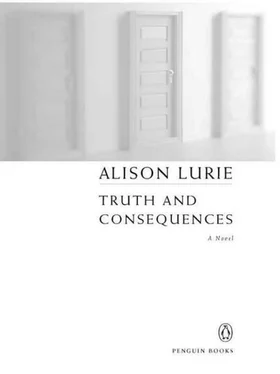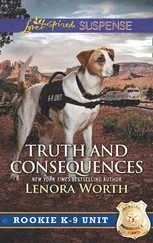Until last May it had mostly been easy to be good—maybe too easy. Occasionally in the past Jane had felt her virtue untested. When Alan first became ill she had almost welcomed it as an opportunity. She had been lucky in life; now she would be the patient and reasonable and loving spouse of an admirable man who had hurt his back and was therefore sometimes impatient and unreasonable and unloving, but would soon be well. It was a test of her virtue, and for many months one that she passed nearly every day. Sometimes people saw her taking and passing this test, and told her that she was wonderful.
And it had been true, for a while. For months Jane had been wonderful to Alan, and Alan had been grateful. But now she was tired of being wonderful, and Alan, she suspected, was tired of being grateful. As time passed, her virtue had failed. Like an old dish towel, it had begun to wear thin, developed holes and creases and stains, and she had begun to turn into a mean, grudging, angry person.
Often in the past, when Jane felt low, she would go out to the garden, and soon her sprits would rise. This year, though, it had been planted too late because of Alan’s operation, and neglected because of all she had to do for him. Though the beans and squash and lettuce were fresh and full and beautiful in the warm sunlight, and the green tomatoes had begun to turn a splendid sunny red, there were bare patches where things had died from lack of water, and weeds everywhere.
Time would continue to pass, but Alan would not get well. He no longer expected to get well, and Jane—though she constantly assured him otherwise—no longer expected it either. His illness would continue to wind itself around them greedily, choking their marriage just as the bindweed was choking her strawberries. They would never get rid of it.
TWO
Some days were better, Alan Mackenzie thought as he lay on the sofa. Some days were worse. All were bad. None were good. Always the pain was there. Alan imagined it as a lizard about ten inches long, its sharp scales mottled red and brown as if with blood and shit. It was there inside his back, gripping his spine with its dry twisted legs and claws, moving its jaw to bite and flicking its forked tongue. He knew what the lizard looked like because he had seen it sixteen months ago in New Mexico. It was spring vacation and he was viewing churches for his current project, a history of religious architecture in America. He was alone: after twenty minutes at the church, Jane had gone to sit in a nearby coffee shop and read the paper.
Alan was around the far side of the building, taking photographs with a heavy camera especially designed for architectural photography. It was a bright but slightly overcast day, ideal for this purpose, and he was happy with the way things were going and with the last set of prints he had collected. He snapped a couple of pictures; then he climbed onto a pile of stones to get a better view, and stepped on something that hissed and shifted. He shouted and leaped back, thinking Snake, stumbled, and dropped his camera with a crack that broke the lens.
But what he had stepped on wasn’t a snake, only a big ugly reddish brown lizard with twisted claws. Strangely, it did not scuttle off, but stood and looked at him. Its bulgy black eyes were hard, and its long jaw moved, as if it were saying something. What? Alan couldn’t tell then, but he knew now: I see you, the lizard was saying. I know you. And you will know me.
As it turned out, that church in Santa Fe was the last one Alan successfully photographed. He had had other trips planned for the summer, and in June he’d actually set out to look at a monastery on the Hudson; but after half an hour he had to stop the car. For the rest of the way Jane drove, while he lay crumpled on the back seat, moaning under his breath from time to time and half sitting up to drink lukewarm bottled water and swallow painkillers. Compared to him Jane was a slow and timid driver, and by the time they got to their destination he was in such agony that he could hardly hold his new and even heavier camera. It was no surprise that those pictures came out blurred and useless.
After that disastrous trip Alan had canceled the others. Jane was visibly relieved. She hated distance driving, and couldn’t bear to see him suffer, she often said. And besides, he knew, though she politely did not say, she couldn’t bear how difficult and impossible he was when he was suffering.
Alan knew he was difficult and impossible, and was becoming more and more so. He also knew that as time went on his pain and self-absorption, his depression and anxiety, were driving his wife further and further from him. She never said this, never even hinted it, but he assumed that she was angry and full of despair, just as he was angry and full of despair. And the fact that she would not admit this somehow made him even angrier, at her dishonesty.
He was almost sure that Jane didn’t love him as he was now, how could she, how could anyone? But month after month she had remained kind and patient and helpful, assuring him that she still cared for him, that they had a wonderful marriage, and this was, as she put it, “just a rough spot.” Alan knew he should feel gratitude; he did feel gratitude. But he felt this gratitude as a weight, increasing every day, tipping the balance further
If she did really still love him it was worse, because he wasn’t sure he loved her. This was now even literally true; it was more than a month since they had last gone through the awkward, self-conscious, often painful process that had taken the place of what used to be one of their happiest and most carefree activities.
Often he woke in the middle of the night and lay moaning and shifting, trying not to wake Jane. At the same time, like a nasty child, he hated her for being asleep and not in pain, and sometimes, meanly and shamelessly, he would moan louder and toss about, trying to wake her, so that she could be aware of how miserable he was. Sometimes he would succeed; more often, ashamed, he would get up, take another pill, and move to the guest room downstairs.
There, as he drifted in and out of an ugly sort of half sleep, he would think of the lizard behind the church, and say to himself that it had been a demon. Not the Devil himself, of course, but a minor member of his company, like those little monsters that appear in the corners of paintings by Bosch, sometimes carrying a pitchfork or a butcher knife. It would be natural that such creatures should hang about outside large old churches, seeking someone to tempt and torture and destroy.
It had taken the demon lizard over a month to follow Alan across the country from Santa Fe to Corinth, but it had not come alone. It had been accompanied or trailed by a gaggle of smaller demons; or, in medical language, complications and side effects. The primary and almost unbearable pain in his lower back was now from time to time accompanied by migratory pains in his left hip, groin, leg, and foot. The strain of trying to find a comfortable position to lie in produced lesser aches in his upper back, neck, and shoulder. The opiates and analgesics he took caused insomnia, headaches, and constipation, which could only be relieved by further drugs with their own side effects—among them indigestion, cramps, and mental confusion. The electronic contraption that blocked maybe twenty percent of the pain produced patches of ugly red rash where the electrodes were attached with a glue to which he was apparently allergic.
Of course, Alan didn’t believe in demons. He had lost his faith years ago, and anyhow the faith he had lost, or maybe only misplaced, the Scotch Presbyterian faith he had been brought up in, didn’t include demons. But sometimes as he lay awake in the spare room, he visualized the lizard and the little accompanying evil creatures that were causing the side effects. The constipation, for instance, he saw as a mud turtle that had taken up residence in his bowels, and the rash was an invasion of invisible red ants.
Читать дальше







![Кэмерон Доки - Правда и ее последствия[Truth and Consequences]](/books/79610/kemeron-doki-pravda-i-ee-posledstviya-truth-and-con-thumb.webp)




